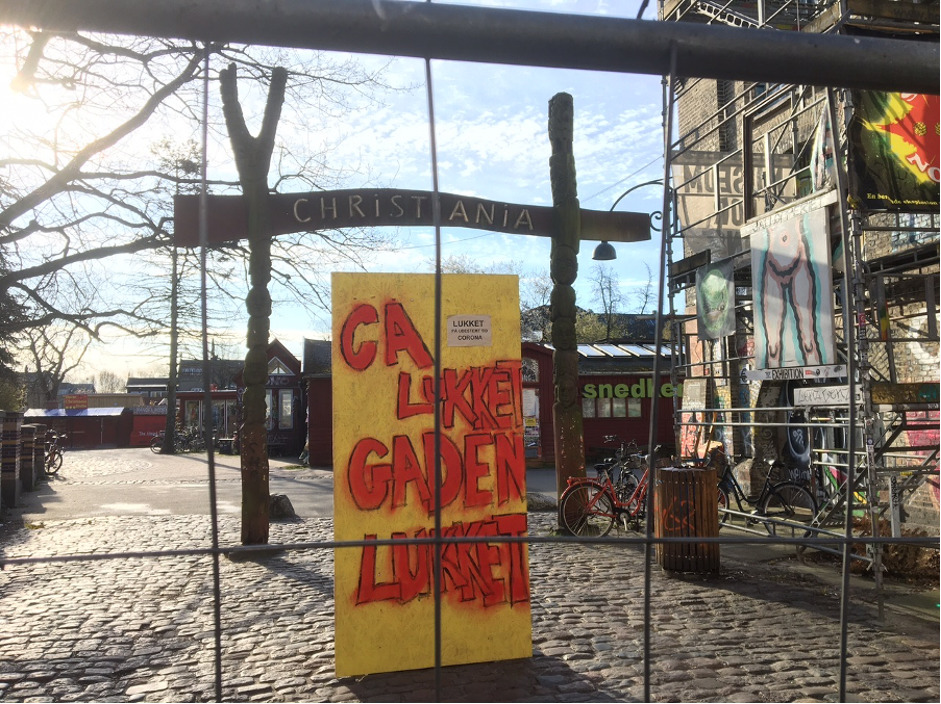Christiania is closed
Report and images from coronavirus shutdown, May 2020
by Anders Lund Hansen, Louise Fabian and Emmerik Warburg
“Christiania is closed” and “The street is closed” reads the sign behind the fenced-off main entrance. “The street” refers to Pusher Street – Christiania’s autonomous open-air cannabis market.

Christiania’s main entrance on March 29 2020
On March 20 2020 Christiania decided to close down of the following day - due to Coved-19.
Anders Lund HansenAn “independent” common-meeting decision on March 20 led to the closing down of the 34,000 m2 freetown in Copenhagen the following day (Christiania 2020). The background for the decision was an informal inquiry by the Danish police, who expressed concern for the spreading of the coronavirus in Christiania’s public spaces. At this point in time, Denmark was officially on lockdown. Many people came to Christiania in the week before the shutdown and were hanging out in large groups – despite the recommendations to keep distance to avoid the spread of the virus. There are 646 people living in Christiania, and 46 percent of residents are between 40 and 65 years old (dr.dk 2017). Christiania normally receives many visitors (500,000 people per year, according to visitcopenhagen.com) to the area’s cultural scene and the recreational areas near the lake. With Pusher Street closing down, the cannabis market moved to the surrounding neighbourhood, Christianshavn. This has led to critique in local internet fora and media as well as in nationally media (e.g. Berlingske Tidende, Ekstra Bladet, Havnefronten, dr.dk). Different sources report that Pusher Street has moved its activities outside Christiania. Furthermore, reports also suggest that not only cannabis is being dealt. In a press release, Christiania (2020) offered a response: “Christiania, as a community, distances itself from the situation […] [in] the areas around Christiania. The people who take part in the activities [...] are not wanted in the freetown Christiania, neither now nor when we open again.”
Founded in 1971 as an alternative freetown squatter community, Christiania has been dealing with issues related to drug use in public (and private) spaces from the very beginning. The freetown is well-known for its open air hash market on Pusher Street, yet the “junk blockade” in 1979/80 is a testimony to Christiania’s efforts in relation to the governing of the narcotic city. Cannabis is tolerated by the local community but is illegal in Denmark; hard drugs are not tolerated in Christiania. People who sell or use hard drugs are excluded from Christiania. It was therefore controversial when national news outlets reported that the police had found large amounts of cocaine in Christiania at the beginning of April 2020. The community officially announced that it “condemns the finding of cocaine” and the use of hard drugs in general (Christiania 2020).
Challenges in relation to COVID-19 and beyond
This is not a complete list, but a list of some of the concerns that have been raised in Christiania’s own weekly newletter Ugespejlet (the Weekly Mirror) and by some people living in Christiania:
The economy: Like in the rest of the Danish society, the shutdown of Christiania has led to decreased income from the small businesses in the freetown (music venues, restaurants, cafes, art and craft, clothing, bicycle stores, etc.). This means that the community’s total income has decreased. This will potentially affect the “brugsleje” (use-rent) that all adults living in Christiania have to pay as part of their residency in the freetown.
Visitors: Among the top 3 tourist attractions in Copenhagen (the two others are Tivoli and The Little Mermaid), Christiania has for decades been blessed and challenged by the great numbers of visitors to the area. Blessed because it has been very important for the community to have the goodwill of many people in their struggles with the Danish state in the past (today Christiania has been legalised and their survival – in some form – is secured). In addition, local businesses (and the community) also benefit from the external resources that the visitors bring. Yet the community is also challenged by visitors’ use of the area (noise, litter, wear on infrastructure and nature, etc.) For some time, the community has internally discussed how to deal with this challenge. Some favour a restriction on outside users, some talk about an “entrance fee” / environmental tax, others talk about a more positive campaign “nudging” visitors to show consideration. Still others argue passionately against any restrictions since they want to keep Christiania open to all – also “quirky characters”; they want to keep the area as what they see as an “exciting, vibrant, multicultural oasis.” The temporary closing down of Christiania due to COVID-19 measures has reinvigorated these discussions (Ugespejlet April-May issues 2020).